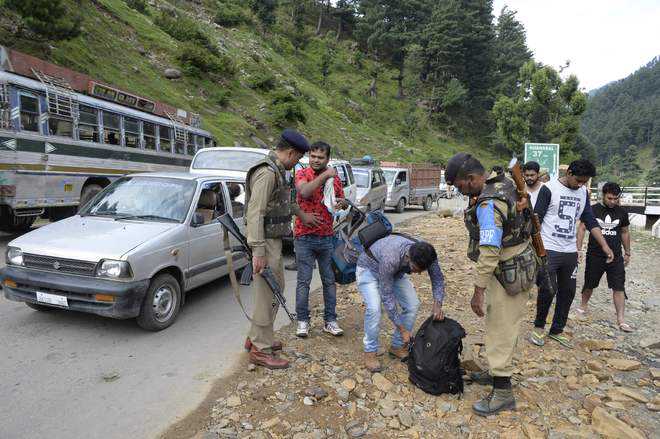Terror strike reopens wounds of 2000
Dinesh Manhotra
Tribune News Service
Jammu, July 11
Monday’s terror strike on Amarnath pilgrims has reopened the wounds of the 2000 attack which claimed lives of over 30 people. From 2000 to 2001, terrorists managed to attack the Amarnath yatra for three successive years but failed to dampen spirit of the devotees.
Although terror groups have repeatedly threatened to attack the annual yatra, they could not succeed in executing any big strike after 2002. The worst-ever terror attack on the yatra came on the intervening night of July 31-August 1 in 2000 at Pahalgam. It left over 30 persons dead. Interestingly, all terror attacks took place during the rule of the National Democratic Alliance.
After 2002, radical groups started gaining ground in the Valley so repeated attempts were made to dismantle all symbols of Kashmiriyat and composite culture.
A systematic and well-organised campaign was launched by radical groups, who camouflaged themselves as social activists and environmentalist, to demonise the Amarnath yatra that symbolises the composite culture of brotherhood and communal harmony in the state.
Not only separatists, some writers, in garb of social activists, started a campaign to rake up peoples’ sentiments against the yatra. On March 5, 2013, a prominent writer of the Kashmir Valley had described the yatra, which is a journey of faith for followers of Lord Shiva across the world, as “religious terrorism.”
Although the Shri Amarnathji Shrine Board (SASB) has made elaborate arrangements to preserve ecology during the annual pilgrimage, some radical groups also started a drive to demonise the yatra by calling it “ecological disaster”. It is a result of awareness campaigns launched by the SASB that not only devotees but the langar organisers also have been ensuring cleanliness during the yatra.
On April 20 this year, a so-called NGO had published a highly provocative report instigating people against the pilgrimage. The report, “Amarnath Yatra: A Militarised Pilgrimage,” was released just before the beginning of the registration of the pilgrims. Its main aim was to rake up sentiment of people against the yatra.
For the past five years, radical leaders, be it Shabir Shah or Sayeed Ali Shah Geelani, have launched a campaign to curtail the yatra’s period and put restrictions on the number of pilgrims.
Terror Trail
July 10, 2017: Seven killed, 19 injured in a terror attack at Botengoo in Anantnag district
August, 2002: Eight killed, 30 injured when terrorists attacked pilgrims at the Nunwan camp at Pahalgam
July 20, 2001: 13 persons, including three women, and two police officers were killed when terrorists hurled grenades at the Sheshnag camp on the way to the cave shrine
August 1, 2000: 32 persons, including 21 pilgrims, were killed when terrorists attacked the Pahalgam base camp










